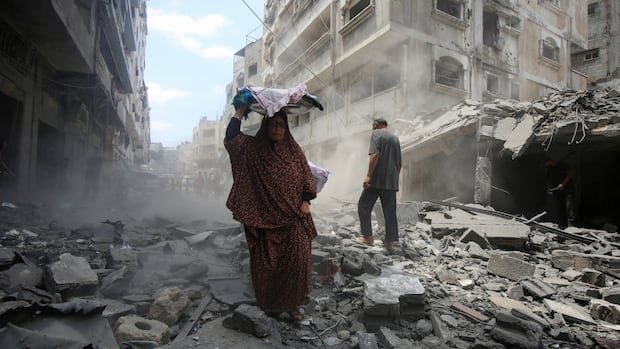Israel’s security cabinet has given the green light to a strategy aimed at seizing control of Gaza City, marking an expansion of military operations in the war-torn Palestinian region. This move has sparked fresh criticism both domestically and internationally for its continuation of the nearly two-year conflict.
Germany, a significant European partner, has announced a suspension of military equipment exports to Israel that could potentially be utilized in Gaza. This decision was met with disappointment by Israeli Prime Minister Benjamin Netanyahu. Meanwhile, other European allies, including Britain and France, have condemned Israel’s decision to escalate military actions in Gaza and have urged a reconsideration of the approach.
In response to the criticism, Netanyahu emphasized to German Chancellor Friedrich Merz that Israel’s objective is to liberate Gaza from Hamas, paving the way for the establishment of a peaceful governance structure without intentions of a full takeover. However, Canadian Prime Minister Mark Carney criticized the plan, highlighting concerns about jeopardizing the lives of remaining hostages in Gaza.
While some countries have been pressuring Israel, U.S. President Donald Trump’s ambassador to Israel, Mike Huckabee, pointed out that the focus should be on the militant group Hamas, which triggered the conflict with a deadly attack on Israel in 2023.
Within Israel, families of hostages held in Gaza and opposition figures have strongly criticized Netanyahu for endangering the lives of the hostages with the decision to advance military operations in Gaza City. The prime minister’s far-right coalition partners advocate for a complete seizure of Gaza as part of the campaign to eliminate Hamas, despite warnings from the military about the potential risks to hostages.
Opposition leader Yair Lapid condemned the deployment of Israeli forces into Gaza City, labeling it a disaster that goes against the advice of military and security experts. Netanyahu, in an interview with Fox News, indicated the military’s intention to assume control over the entire Gaza region.
The announcement from the prime minister’s office on Friday came after a security cabinet meeting the previous day, confirming the military’s plan to take over Gaza City. The endorsement of this plan by the Israeli cabinet is highly anticipated.
Residents of Gaza City, such as Qaz’at Porter and Alaa Al-Junaid, expressed dismay and called for international compassion as they face ongoing displacement and uncertainty due to the conflict. The potential capture of Gaza City by the Israeli military could significantly alter the dynamics of the conflict, as the city is considered the stronghold of Hamas within Gaza.
European leaders, including European Commission President Ursula von der Leyen, and regional powers like Saudi Arabia have urged Israel to reconsider its decision to advance into Gaza City. Despite international condemnation, Huckabee criticized the disproportionate pressure on Israel, emphasizing the need to address Hamas’s actions.
As tensions escalate, the fate of the hostages in Gaza remains uncertain, with diplomatic negotiations for a ceasefire stalling. The Israeli government’s push for a full occupation of Gaza has raised concerns about the humanitarian crisis in the region and has garnered criticism both at home and abroad.
Domestically, Netanyahu’s stance on disarming Hamas and maintaining military operations until this goal is achieved has faced opposition from various sectors, including families of hostages and public opinion calling for a diplomatic resolution. The decision to pursue a full occupation of Gaza has been met with apprehension and concern, with many fearing dire consequences for the hostages and the broader Israeli society.

